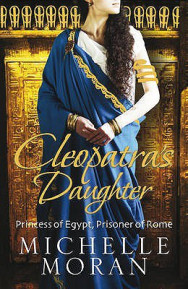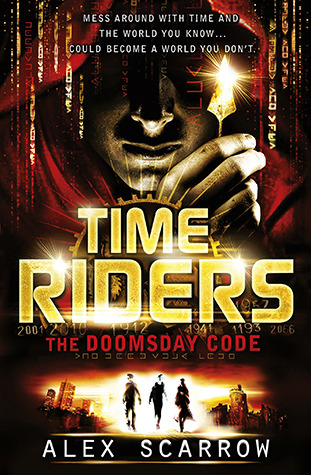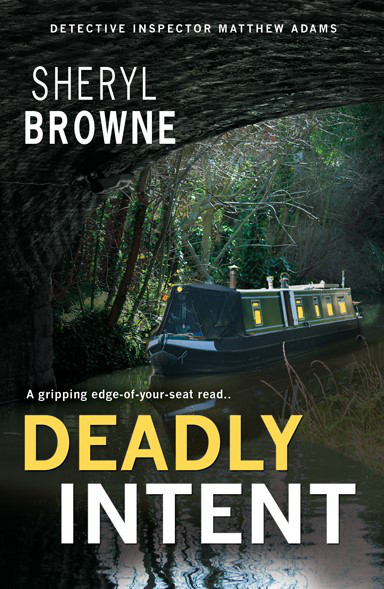Waiting for the two double-Cs to appear in the Bosco Theatre, I studied those cracks in the floor again. It’s not just the poor stiletto heel that needs protecting. You could chuck pens down there, even the whole notepad. Or why not your mobile phone? I mean, I know why not the phone, but it’d slip so easily. I held on to my pen and pad and put everything else away.
I was sure there’d be plenty of people, because Cat Clarke has lots of fans, meaning that even though Christoffer Carlsson might have begun the evening a relatively unknown foreigner, he’d win fans during the event. So, lots of teen girls and a few older girls like myself. And two grown men, one of whom was fellow author Jared Thomas.
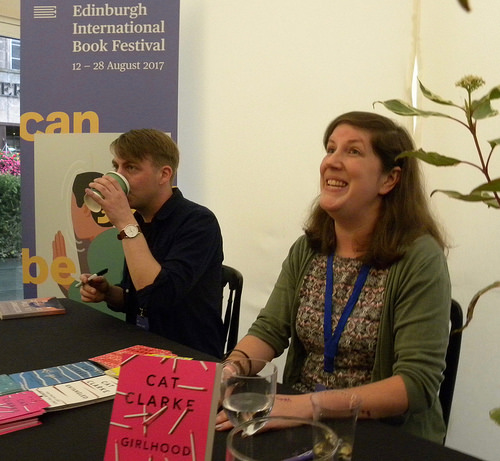
When the CCs and their chair Ann Landmann arrived, walking down those steps to sit underneath the glittering disco ball, I noticed that Christoffer carried a Fjällräven rucksack, blue with leather straps. Naturally.
Ann urged us to come closer, to get ready for the audience participation, saying the trapeze would be lowered later, and that perhaps they’d better lock the door so we couldn’t escape. Not a soul, apart from Jared, moved…
She also said there’d be a signing afterwards, in the signing Portakabin, the ‘white kind of box’ near the theatre. I’m glad she said it. I’d hate to be complaining about its, erm, lack of space.
Having forgotten the title of the event, Ann referred to Death & Murder, two of her favourite subjects, pointing out that Swedish Christoffer has a ‘real degree’ – to which Cat added, a PhD – in criminology. ‘A terrible over-achiever.’ And Cat is ‘not quite homegrown,’ having been born in Zambia, but Ann doesn’t think she has ‘a strange accent.’
So that Ann could shut up for ten minutes, she handed over to her guests, asking them to read. Cat said her book Girlhood is set in a boarding school (she loves them!), and she read from chapter five, about some sort of initiation of a new girl which, to be honest, is why I don’t want to go to boarding school. But I can see that it’s better to be wearing the Trump mask, as you don’t have to look at it.

Christoffer told us about Halmstad, asking if anyone has heard of Roxette, and described the darkness of Småland, where October is the Coldest Month is set. He read the first chapter where we meet Vega. Both books feature darkness, rain and cold, so not much difference between Scotland and Sweden.
An obsession with Mallory Towers made Cat set this book in a boarding school, and needing a mix of the best and the worst in life, she gave her heroine a dead twin. Christoffer hears voices, by which he meant he talks to his characters. He has to write fast to get it down on paper, and many ideas don’t work. Unlike other Swedish authors who set their books in Stockholm or Gothenburg, or even ‘mid-level cities’ such as Örebro, he chose the countryside close to where he grew up. He wanted to write about violence against women.
This wasn’t planned as a YA book, but he realised he was writing for himself at 17. And that way you can have a smaller book; one that fits in a pocket and can be read on the bus.
Cat feels it’s fun to explore teenage feelings, and said the new girl is a bit weird. She had an idea to begin with, but it changed, and she feels Girlhood is more honest than her other books. But she never did pretend to be a prospective parent at a boarding school, to find out more, and left this to a documentary about Gordonstoun.
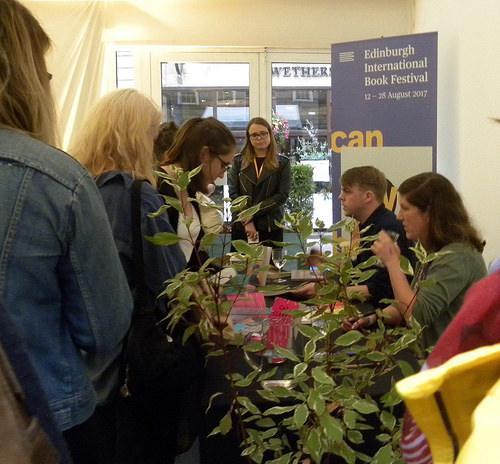
Christoffer wrote his book during the summer, in Halmstad, where he now feels like an outsider, belonging neither there nor in Stockholm where he lives. A bit like Vega. His dad who never usually reads, has in fact read October is the Coldest Month, while his mum hasn’t, although this keen reader always reads all his books, at the expense of everything else. The title refers to the TS Eliot poem about April being the cruellest month. He set the story in October, because he needed Vega not to be going to school.
As for Cat, she had lots of titles for Girlhood, including one she might use for some other book. Regarding characters’ names, she has to like them, and they must type easily. Such as Harper in Girlhood, which unlike George is easy on the keyboard. She does find though that good names are running out. Even bad characters have to have good names.
I found that Christoffer used the word ‘sucks’ a lot. He needs to learn to be ‘crap at’ things in Britain. Anyway, he gets up early, to write from five am, until maybe eleven. He can edit anytime, but not write. Cat writes in chunks of 25 minutes, acording to the Pomodoro Technique, although she might be taking rather longer breaks than prescribed. She too has to write before noon. This book took her two years to write, which is too long, for someone who is not famous, although Cat aspires to be Donna Tartt one day.
Describing writing like go-karting, Christoffer swore enough that he had to stop and apologise, even if his replacement word was only marginally more sanitised… The pitfalls of a second language. He feels one difference between YA and adult novels is that the sentences can be shorter. He’s a middle class man living in Stockholm, writing about a working class teenager in the countryside, and the book needs to be accessible to everyone, including non-readers.
The last, and really excellent, question from the audience was on hating what you write. Cat said this is normal. You should write, even if it is crap. ‘Crap can be moulded.’
And on that note we piled out and over to the Portakabin.
Advertisements Related